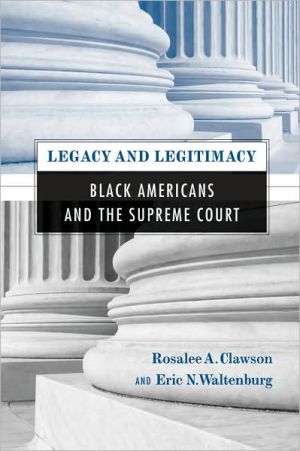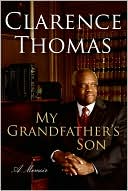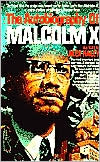Legacy and Legitimacy: Black Americans and the Supreme Court
"Thoroughly grounded in the latest scholarly literature, theoretical sources, and experimental results, Legacy and Legitimacy substantially advances understanding of Black Americans' attitudes toward the Supreme Court, the Court's ability to influence Blacks' opinions about the legitimacy of public institutions and policies, and the role of media in shaping Blacks' judgments." "Drawing on legitimacy theory - which explains the acceptance of or tolerance for controversial policies - the...
Search in google:
"Thoroughly grounded in the latest scholarly literature, theoretical sources, and experimental results, Legacy and Legitimacy substantially advances understanding of Black Americans' attitudes toward the Supreme Court, the Court's ability to influence Blacks' opinions about the legitimacy of public institutions and policies, and the role of media in shaping Blacks' judgments." "Drawing on legitimacy theory - which explains the acceptance of or tolerance for controversial policies - the authors begin by reexamining the significance of "diffuse support" in establishing legitimacy. They provide a useful overview of the literature on legitimacy and a concise history of the special relationship between Blacks and the Court. They investigate the influences of group attitudes and media "framing." And they employ data from large-scale surveys to show that Blacks with greater levels of diffuse support for the Court are more likely to adopt positions consistent with Court rulings." With its broad scope and inclusion of new experimental findings, Legacy and Legitimacy will interest students and scholars of judicial politics, racial politics, media and politics, black studies and public opinion.Philip Y. Blue - Library JournalThe U.S. Supreme Court's Earl Warren-era revolution in the areas of civil, individual, and privacy rights is the focus of this historical and statistical treatise, which combines sociology with survey analysis in a successful effort to prove that Brown v. Board of Education and related Supreme Court decisions of the 1950s and 1960s have created a well of goodwill toward the Court among African Americans. The Court therefore enjoys a legacy of legitimacy among black Americans, according to Clawson and Waltenburg (both political science, Purdue Univ.). The concept of political legitimacy as a stabilizing force is central to the book's theme and is particularly important in a pluralist democracy such as the United States, where constituents regularly lodge competing demands, thereby placing stresses upon the political system. The authors seek to measure, through a series of extended surveys and intricate statistical analysis, the one institution of government that most effectively regulates pluralist conflicts and rallies support for the regime. They then conclude that relative to other institutions, the Supreme Court has the greatest capacity to legitimize policies. Recommended for academic libraries.
1 Introduction 112 Music of Corruption: Jazz as Social Threat in the Early Twenties 223 "Some Finer Thing": Jazz Amid the Culture Wars of the Late Twenties 394 The Market of Music: Jazz and the Great Depression in the Harlem Renaissance 585 White Jazz: A Primitive Commodity 746 Defining a Nation: Jazz and American Identity in the Early Forties 937 Music of Contradictions: Reconciling U.S. Domestic and Foreign Identities 1098 "Gin, Jazz, and Dreams": Cultivating the Hipster Aesthetic in Ellison, Mailer, and Beaumont 1229 A Racial Paradise: The Ambiguity of Identity in The Horn by John Clellon Holmes and On The Road by Jack Kerouac 13910 Conclusion 164Notes 171Works Cited 183Index 189
\ Library JournalThe U.S. Supreme Court's Earl Warren-era revolution in the areas of civil, individual, and privacy rights is the focus of this historical and statistical treatise, which combines sociology with survey analysis in a successful effort to prove that Brown v. Board of Education and related Supreme Court decisions of the 1950s and 1960s have created a well of goodwill toward the Court among African Americans. The Court therefore enjoys a legacy of legitimacy among black Americans, according to Clawson and Waltenburg (both political science, Purdue Univ.). The concept of political legitimacy as a stabilizing force is central to the book's theme and is particularly important in a pluralist democracy such as the United States, where constituents regularly lodge competing demands, thereby placing stresses upon the political system. The authors seek to measure, through a series of extended surveys and intricate statistical analysis, the one institution of government that most effectively regulates pluralist conflicts and rallies support for the regime. They then conclude that relative to other institutions, the Supreme Court has the greatest capacity to legitimize policies. Recommended for academic libraries.\ —Philip Y. Blue\ \ \








